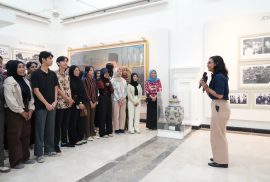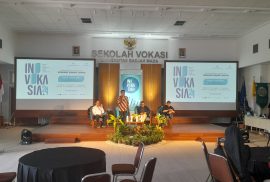Wednesday, May 8, 2024, Archaeology students of the Faculty of Cultural Sciences UGM conducted a field study activity with a visit to Istura Gedung Agung or known as the Presidential Palace of Yogyakarta. As a fulfillment of the mandatory Basic Conservation and Restoration course, this visit involved two batches of Archaeology students, Class of 2021 and Class of 2022, totaling more than 70 students who were guided by the Head of the UGM Archaeology Department, Dr. Mahirta, MA… The students each departed and arrived at the location at 08.30 WIB to gather and give directions by the mentors and instructors regarding matters that need to be considered during the visit.
The tour of the visiting group began with an introduction to the outside of the complex building around Istura Gedung Agung such as the guesthouse and the main building of Istura Gedung Agung along with a brief introduction to the three main rooms where the President welcomed guests. Next, the group of students was directed to the museum building, the Yogyakarta Presidential Palace Museum, to conduct an exclusive tour of the museum’s historical object collections with the art object management guide of the Yogyakarta Presidential Palace Museum, Theresa Sekar Wening, who is also an alumni of the Javanese Language, Literature and Culture Undergraduate Study Program.
While visiting the museum, the group was shown collections of art objects painted by famous artists such as expressionism or abstract paintings by painter Affandi Koesoema as well as a number of ceramic pottery artifacts, necklaces, and others. Not only seeing paintings and historical artifacts, the students also analyzed the conservation methods and techniques of historical objects according to the objectives of the courses studied. Through interactive museum visits, students are expected to gain knowledge that can be practiced when managing historical and archaeological objects as part of museum management.






